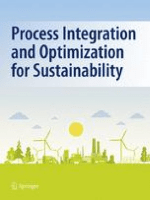
Process Integration and Optimization for Sustainability
Scope & Guideline
Optimizing Pathways to Sustainability Excellence
Introduction
Aims and Scopes
- Process Integration Techniques:
The journal emphasizes the application of process integration techniques to enhance resource efficiency and minimize waste in industrial settings. - Sustainability Assessment:
It covers methodologies for assessing sustainability in various processes and systems, including life cycle assessment and eco-efficiency evaluations. - Renewable Energy Optimization:
Research related to optimizing renewable energy systems, including solar, wind, and biomass, is a significant focus area. - Supply Chain Sustainability:
The journal explores sustainable supply chain practices, including green logistics, circular economy strategies, and inventory management. - Advanced Optimization Models:
It features studies employing advanced optimization models, including multi-objective optimization and hybrid algorithms, to solve complex sustainability challenges. - Technological Innovations for Sustainability:
The journal encourages submissions on innovative technologies and methodologies that contribute to sustainable development across various industries.
Trending and Emerging
- Digitalization in Sustainability:
There is a rising trend in exploring the intersection of digital technologies and sustainability, including the use of IoT, AI, and big data analytics to enhance process efficiency and decision-making. - Circular Economy Models:
Research focusing on circular economy principles, particularly in supply chain management and waste reduction, is increasingly prominent, reflecting a broader industry shift towards sustainability. - Techno-Economic Assessments:
Emerging studies are increasingly incorporating techno-economic assessments to evaluate the feasibility and sustainability of new technologies, particularly in renewable energy and resource management. - Resilience and Adaptability in Systems:
There is a growing interest in the resilience of systems, particularly in the context of climate change and resource scarcity, with research focusing on adaptive strategies in various sectors. - Integrated Water-Energy-Food Nexus:
Research on the integrated management of the water-energy-food nexus is gaining importance, highlighting the interdependencies between these critical resources and their sustainable management.
Declining or Waning
- Traditional Energy Systems:
There is a noticeable decline in research focusing solely on traditional energy systems without integrating renewable sources, indicating a shift towards more sustainable alternatives. - Single-Factor Optimization Studies:
Research that emphasizes single-factor optimization approaches without considering broader sustainability impacts is becoming less prevalent, as multi-faceted approaches gain more attention. - Basic Inventory Management Techniques:
Conventional inventory management techniques that do not incorporate sustainability metrics or advanced modeling are less frequently published, reflecting a move towards more integrated and sustainable approaches. - Generalized Environmental Impact Assessments:
Studies providing generalized assessments without specific methodologies or innovative frameworks are less common, suggesting a preference for detailed, methodological contributions. - Outdated Manufacturing Practices:
Research focusing on outdated manufacturing practices that do not align with current sustainability paradigms is declining, as newer, more efficient techniques are prioritized.
Similar Journals
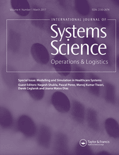
International Journal of Systems Science-Operations & Logistics
Unveiling Insights in Systems Science and OperationsInternational Journal of Systems Science-Operations & Logistics, published by TAYLOR & FRANCIS LTD, stands as a leading platform for the dissemination of high-quality research in the fields of operations science, logistics, and systems management. With an ISSN of 2330-2674 and an E-ISSN of 2330-2682, the journal is recognized for its rigorous peer-review process and its commitment to advancing theoretical and practical insights in the discipline. As of 2023, the journal proudly holds Q1 rankings in Information Systems, Information Systems and Management, and Management Information Systems, demonstrating its significant impact within the academic community. Additionally, it ranks within the top 20% of journals in categories such as Management Science and Operations Research and Decision Sciences. Researchers and professionals in the fields of management and logistics will find the journal invaluable for accessing cutting-edge research that addresses contemporary challenges. The journal’s diverse scope and relevance to real-world applications ensure it remains an essential resource for scholars and practitioners alike. With a converged publication timeline from 2014 to 2024, it continues to play a pivotal role in shaping discussions and innovation in systems science.

Chemical Product and Process Modeling
Transforming chemical processes with cutting-edge modeling techniques.Chemical Product and Process Modeling is a vital academic journal published by WALTER DE GRUYTER GMBH, focusing on the intricate intersection of chemical engineering and mathematical modeling. Since its inception in 2006, this journal has been instrumental in disseminating significant research findings and methodologies that advance the modeling and simulation of chemical products and processes. With an ISSN of 1934-2659, it caters to a global audience from its base in Berlin, Germany. Although positioned within the Q3 and Q4 quartiles in Chemical Engineering and Modeling & Simulation categories respectively in 2023, it offers a platform for innovative approaches and contributions in these fields, making it a resource for researchers and industry experts alike. Access to the journal's content is offered through subscription models, enabling professionals and academics to stay abreast of the latest developments. In a rapidly evolving scientific landscape, Chemical Product and Process Modeling remains dedicated to enhancing knowledge and fostering collaboration within the chemical engineering community.
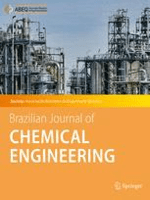
BRAZILIAN JOURNAL OF CHEMICAL ENGINEERING
Shaping the Future of Chemical Engineering, TogetherThe Brazilian Journal of Chemical Engineering (ISSN: 0104-6632, E-ISSN: 1678-4383), published by Springer Heidelberg, stands as a prominent open-access journal dedicated to disseminating innovative research and advancements in chemical engineering since its inception in 1997. With a commitment to enhancing knowledge exchange within the field, this journal is indexed in Scopus, earning a respectable Q3 rank in the category of General Chemical Engineering as of 2023. It provides a platform for researchers, professionals, and students to explore a diverse range of topics, fostering collaboration and innovation from its base in Brazil. The journal has converged its operations from 1995 and will continue to push the boundaries of chemical engineering research until 2024 and beyond. As a critical resource for up-to-date methodologies and emerging trends, the Brazilian Journal of Chemical Engineering is essential for those aiming to make impactful contributions in this dynamic and evolving field.
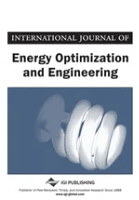
International Journal of Energy Optimization and Engineering
Transforming Energy Challenges into OpportunitiesThe International Journal of Energy Optimization and Engineering, published by IGI Global, is a leading platform dedicated to advancing the field of energy management and optimization. With its ISSN 2160-9500 and E-ISSN 2160-9543, this journal serves as an essential resource for researchers, professionals, and students interested in innovative strategies for energy efficiency and sustainability. Although it does not currently offer Open Access options, the journal is committed to high-quality peer-reviewed content that aims to address the pressing challenges of energy consumption, renewable resources, and optimization techniques in engineering applications. The significance of this journal in the evolving landscape of energy technologies makes it an invaluable source for those aspiring to contribute to the development of sustainable energy practices across the globe.
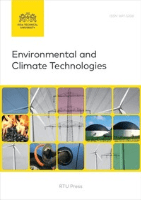
Environmental and Climate Technologies
Innovating Research for Climate Resilience.Environmental and Climate Technologies is a premier open-access journal dedicated to advancing knowledge in the fields of environmental science and renewable energy. Published by SCIENDO since 2009, this journal plays a crucial role in disseminating innovative research and interdisciplinary studies that address the pressing challenges posed by climate change and sustainable development. With its current positioning in the Q2 quartile for Environmental Science (miscellaneous) and Q3 for Renewable Energy, Sustainability and the Environment, it is recognized for its significant contributions to the academic community, ranking #107 out of 233 in General Environmental Science and #161 out of 270 in Renewable Energy. Hailing from Germany and operating under an open-access policy, Environmental and Climate Technologies ensures that research remains accessible to a global audience, fostering collaboration and discussion among researchers, professionals, and students alike. The journal invites rigorous scientific inquiries and practical solutions that can mitigate the impact of climate-related issues, making it a vital resource for those committed to environmental stewardship and sustainability.
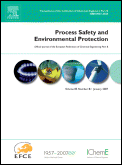
PROCESS SAFETY AND ENVIRONMENTAL PROTECTION
Pioneering research that protects our planet and its people.PROCESS SAFETY AND ENVIRONMENTAL PROTECTION, published by Elsevier, is a premier academic journal dedicated to advancing the fields of chemical engineering, environmental science, and safety management. With an impressive impact factor, this esteemed journal undergoes a meticulous peer-review process and serves as a vital platform for researchers, professionals, and students seeking to disseminate cutting-edge research and innovative practices. Submissions are welcome in a wide scope of topics related to safety, risk, reliability, and environmental engineering, demonstrating its influence as a Q1 journal across multiple categories, including Environmental Chemistry and Safety, Risk, Reliability and Quality. By providing a rigorous analysis of current challenges and solutions in the domain since its inception in 1990, it continues to foster interdisciplinary collaboration and practical applications in the United Kingdom and beyond. With the journal not currently offering Open Access options, subscribers gain exclusive access to pivotal insights that shape industry standards and drive advancements in sustainable practices.
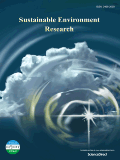
Sustainable Environment Research
Pioneering solutions for a cleaner, greener planet.Sustainable Environment Research, an esteemed journal published by BMC, serves as a pivotal platform for disseminating innovative research in the fields of Environmental Engineering, Pollution, and Renewable Energy. Established in 2016 as an Open Access journal, it facilitates the widespread sharing of knowledge and advancements across the globe, reflecting its commitment to enhancing environmental sustainability. With an impressive Q1 ranking in multiple categories, including Water Science and Technology and Pollution, the journal is recognized for its significant impact, currently holding a rank of 31st in Environmental Science - Water Science and Technology. The journal actively invites researchers, professionals, and students to contribute to crucial discussions around sustainable practices and technologies, thus addressing worldwide environmental challenges. Based in Taiwan but accessible internationally, Sustainable Environment Research provides a valuable resource for those dedicated to advancing the science of sustainability.
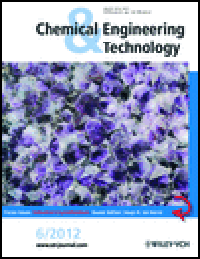
CHEMICAL ENGINEERING & TECHNOLOGY
Transforming Research into Real-World ApplicationsChemical Engineering & Technology is a prestigious journal published by Wiley-VCH Verlag GmbH, focusing on the evolving field of chemical engineering and its related disciplines. With an ISSN of 0930-7516 and E-ISSN of 1521-4125, the journal has established a robust platform for researchers and practitioners to share pioneering studies and innovative technologies within the field. Classified in the second quartile (Q2) across multiple categories such as Chemical Engineering, Chemistry, and Industrial and Manufacturing Engineering, it holds an impressive rank in the Scopus database, indicating its significant contribution to the academic community. The journal's commitment to advancing knowledge is reflected in its extensive convergence of research from 1987 to 2024, providing a comprehensive archive of scholarly work. Researchers, professionals, and students benefit from the latest insights and findings, enriching the dialogue around chemical processes and methodologies. Though it operates under a traditional subscription model, the accessibility of this journal is crucial for those engaged in both theoretical and applied aspects of chemical engineering.

Green Chemical Engineering
Fostering collaboration in sustainable chemical innovation.Green Chemical Engineering, an esteemed journal published by KEAI PUBLISHING LTD, plays a pivotal role in advancing the field of sustainable chemical engineering. With an Open Access policy since 2020, this journal facilitates the free exchange of cutting-edge research and innovations that address critical environmental challenges. Based in China, it has rapidly gained recognition with impressive category quartiles, ranking Q1 in numerous relevant fields including Catalysis, Chemical Engineering (miscellaneous), Filtration and Separation, and Process Chemistry and Technology. Its presence in Scopus highlights its significance, with top rankings (e.g., Rank #4/19 in Filtration and Separation) placing it in the upper echelons of chemical engineering literature. Designed for researchers, professionals, and students alike, Green Chemical Engineering aims to foster a collaborative platform for the dissemination of pioneering work that contributes to a greener and more sustainable future.

PERIODICA POLYTECHNICA-CHEMICAL ENGINEERING
Exploring Multidisciplinary Frontiers in Chemical EngineeringPERIODICA POLYTECHNICA-CHEMICAL ENGINEERING is a distinguished journal published by the Budapest University of Technology and Economics, focusing on the diverse field of chemical engineering. Established in 1968 and transitioning to Open Access since 1999, this journal provides a vital platform for sharing cutting-edge research and innovations in chemical engineering and related disciplines. With an HIndex that reflects its growing influence and categorized in the Q3 Quartile for Chemical Engineering (miscellaneous) in 2023, PERIODICA POLYTECHNICA aims to facilitate the dissemination of knowledge among researchers, professionals, and students alike. The journal's Scopus rankings in Environmental Science, General Chemistry, Materials Science, and Biochemistry showcase its multidisciplinary approach, making it an essential resource for anyone engaged in advancing their expertise in chemical engineering and the broader scientific community. Located in Hungary, PERIODICA POLYTECHNICA continues to contribute to the academic dialogue and inspire innovative solutions to contemporary challenges.